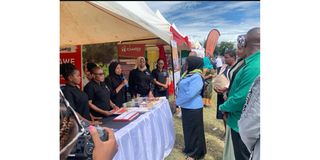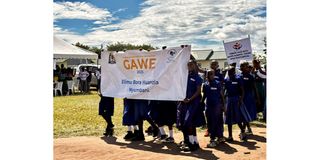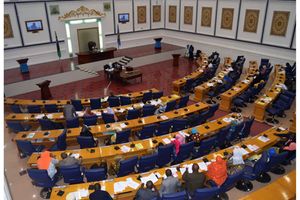Tanzania urged to reform education with focus on life skills

Katavi Regional Commissioner, Ms Mwanamvua Mrindoko, listens attentively to an explanation by the Chairperson of the CAMFED-supported Girls' Network, Ms Shamsa Mkurungo, during her visit to the exhibition booth at the launch of Global Action Week for Education (GAWE), held in Mpimbwe District Council, Mlele District, Katavi Region.
What you need to know:
- Chairperson of the Tanzania Education Network (TEN/MET), Ms Faraja Kota, speaking on 5 May 2025 during the launch of GAWE, which was organised by TEN/MET, stressed that in today’s rapidly evolving world, genuine development cannot be achieved without a skills-based approach to education.
Katavi. As Tanzania joins the rest of the world in commemorating Global Action Week for Education (GAWE), stakeholders in the education sector have put forward several key recommendations, including prioritising investment in education that equips young people with practical life skills.
Gathering in Mpimbwe District Council, Katavi Region, to mark the week, education advocates emphasised the need for an education system in Tanzania that enables young people to apply their knowledge in real-life situations.
Chairperson of the Tanzania Education Network (TEN/MET), Ms Faraja Kota, speaking on 5 May 2025 during the launch of GAWE, which was organised by TEN/MET, stressed that in today’s rapidly evolving world, genuine development cannot be achieved without a skills-based approach to education.
She noted that this year’s theme, “Education and Skills for National Development,” seeks to highlight the urgency of investing in education that builds capacity and imparts life skills among young people. This, she argued, is critical to enabling youth to participate meaningfully in nation-building and the pursuit of sustainable social progress.
“We need an education system that empowers young people to use their knowledge practically—to launch income-generating projects, engage in innovation, and contribute fully to national development,” Ms Kota stated.
She acknowledged the progress Tanzania has made in the sector—including increased enrolment in primary and secondary schools, policy reforms, curriculum revisions to match current needs, and infrastructure development—but warned that challenges remain.

These include budget constraints, lack of school meals, teenage pregnancies, violence against students, inadequate infrastructure, and a shortage of teachers.
To address these issues, the network recommended strengthening Technical and Vocational Education and Training (TVET).
“The government should scale up investment in vocational institutions and hands-on training programmes to ensure secondary school graduates acquire the skills needed for self-employment and active participation in the country’s development,” she urged.
“We also propose the abolition of corporal punishment in schools and recommend the introduction of alternative child-friendly disciplinary methods that uphold human dignity and foster a safe learning environment.”
Ms Kota further called on the government to increase the education budget to at least 20% of the national budget, in order to fully implement education policies and ensure high-quality service delivery.
Another key recommendation was to monitor the implementation of the re-entry policy for students who have dropped out, and to strengthen follow-up systems to ensure that every child has the opportunity to return to school and continue learning.
Regional Commissioner of Katavi, Ms Mwanamvua Mrindoko, speaking at the same event, condemned the harmful cultural practice of "chagulaga", which has been cited as a major reason for girls dropping out of school in the region.
Practised by some Sukuma communities residing in Mpimbwe, chagulaga involves abducting girls and forcing them into early marriages.
“One pressing issue here in Mpimbwe is the chagulaga tradition. This is the right time to put an end to this harmful custom that removes girls from the education system. It significantly undermines our progress,” Ms Mrindoko said.
“Schools were not built just for the sake of having buildings; they were brought to liberate the minds of Tanzanian children. If we continue to tolerate chagulaga, we will keep sacrificing the futures of our girls.”
“From today, I want a clear strategy to eradicate this practice. And while that strategy is being implemented, let me be clear: if you are a young man, marry someone your own age—do not marry a student. Let girls stay in school and get educated.”
Speaking on the event, the Chairperson of the Girls’ Network funded by Camfed, Shamsa Mkurungo, stated that through a range of programmes implemented by the organisation to support girls, concerted efforts are being made to ensure that this group remains within the education system.
“Through Dunia Yangu, we support Form One and Form Two students to learn life skills that help them understand themselves, who they are, and what they want to achieve. These are essential for helping them stay focused on their education and long-term goals,” she said.





